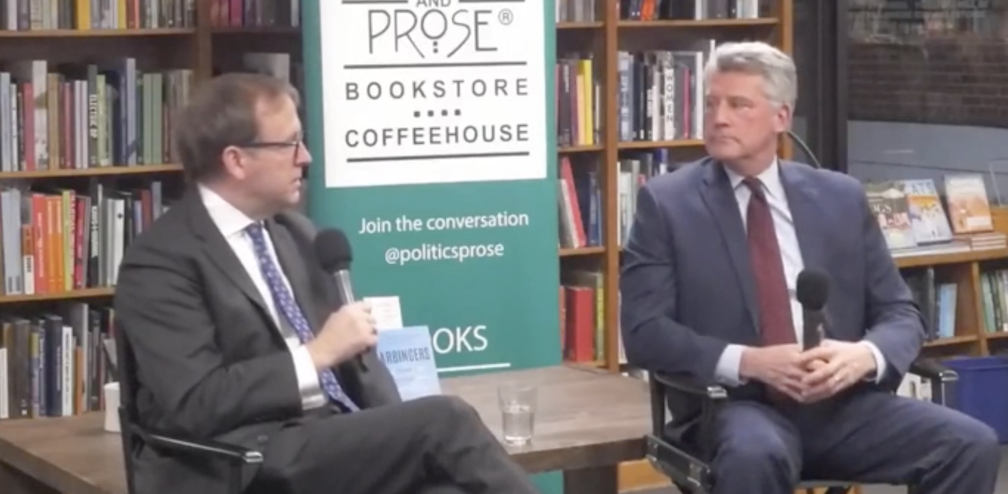Politics
ABC Host Admits Trump ‘Hush Money’ Case Was Frivolous: ‘Why Is This Even Being Prosecuted?’

ABC News host Jon Karl appeared to admit that Manhattan District Attorney Alvin Bragg’s “hush money” case against President-elect Donald Trump was frivolous and unnecessary while speaking at a Politics and Prose book event in Washington D.C. The ABC host stated that the charges against Trump were “tawdry,” at one point asking why the case was even being tried at all.
While Trump was criminally charged in four separate criminal cases — two of which were brought by the Biden Department of Justice — Bragg’s “hush money” case is the only one that ever made it to trial. Fulton County District Attorney Fani Willis’ laughable racketeering case against Trump and a number of key allies is dead as Willis is being investigated for numerous instances of impropriety, while U.S. District Judge Aileen Cannon dismissed Special Counsel Jack Smith’s case concerning the handling of classified documents earlier this year. Smith — who was unconstitutionally appointed according to Cannon’s ruling — opted to “wind down” his additional case against Trump over challenges to the 2020 election after the president elect’s victory in November.
On Friday, Karl spoke with Tim Heaphy, an author who recently penned a hyperbolic analysis of the January 6 Capitol protests at a D.C. bookstore. While discussing the criminal cases against Trump, he noted that Bragg’s case was convoluted and hard to follow for the general public. “Ultimately, the only criminal trial that happened related to the past and future president was the one in New York. A pretty complicated case involving payments that his fixer and lawyer made to a porn actress. Falsification of records, in and of itself wasn’t a felony,” he said, adding that Bragg needed to apply highly questionable legal theories in order to charge Trump with felonies. “I mean, you know, it’s a it’s a pretty complicated tawdry set of… And you think, that’s the thing he went on trial for?”
Karl then conceded that a “fair observer could look at that New York case and say, why is this even being prosecuted?”
President-elect Donald Trump was sentenced this past Friday after being convicted of 34 felony counts of “falsifying business records” by a Manhattan jury earlier this year. D.A. Bragg — who campaigned on finding a way to prosecute the former president — accused then-candidate Trump of falsifying business records concerning payments to Stormy Daniels, a porn star. The leftist prosecutor argued that Trump classifying the payments as “legal fees” constituted a crime of falsifying business records, a shaky contention that would have generally resulted in a single misdemeanor charge at most. Statutes of limitations had also expired, though this did not stop Bragg from using COVID-era statutes to expand them and charge Trump with 34 felony counts of falsifying business records.
In order for the offenses to be charged as a felony, Bragg would have needed to prove that the payments were covered up in order to conceal another crime. The supposed “additional crime” was never identified by Bragg, while Judge Juan Merchan told jurors that they did not need to agree on what the supposed crime even was. Despite the dubious nature of the case, a Manhattan jury found Trump guilty after brief deliberations back in May.
The president-elect has described the case as a political witch hunt and has vowed to appeal. “This is a case that, from what I read and what I hear, that was inappropriately handled before [Bragg] got there,” Trump said during Friday’s sentencing hearing. The president-elect was speaking in reference to Matthew Colangelo, who previously worked as one of the most senior officials in the Biden DOJ before taking a low-level prosecutor’s job with Bragg’s office. “That gentleman, from what I heard, was criminal or almost criminal in what he did. It was very inappropriate. It was somebody involved with my political opponent.”
“The people of this country understand what’s going on. They understand this is a weaponization of government. They call it lawfare. Never happened to any extent like this, but never happened in our country before, and I’d just like to explain that I was treated very, very unfairly,” the president-elect concluded in a defiant pre-sentencing statement.
RELATED: Analyzing The Four Most Glaring Examples Of Political Bias In The Trump ‘Hush Money’ Case

